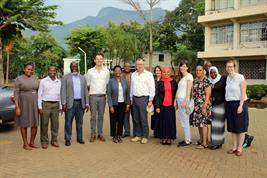07.03.2019
Press Release

Michael Stübgen (MdB, CDU), Parliamentary State Secretary of the Federal Ministry of Food and Agriculture (BMEL), visited a Leibniz Centre for Agricultural Landscape Research (ZALF) project in the East African country Tanzania on March 1st and 2nd. Since 2015, a team from ZALF and the University of Hohenheim has been working jointly with partners from science and practice on local solutions related to agricultural production in the Scale-N project. The aim is to reduce malnutrition through education and technical innovation.
Climate change is hitting the African continent particularly hard. Those sections of the Tanzanian population affected by hunger and poverty are suffering most from the increase in extreme weather conditions. The Food Security and Nutrition Report of the United Nations 2018 (FAO) provides insights into the situation on the ground: Household surveys show that the strong fluctuations in the rainy seasons over the last five to ten years alone have reduced average income by around 35 percent. At the same time, dependence on agriculture as a source of income and for food security is high: 69 percent of the food produced in Tanzania is grown on small farms.
The Scale-N project, launched in 2015, addresses precisely this issue. Over the past three years, the scientists have been working together with the communities to develop solutions that will improve food security for the rural population in five work packages:
- Knowledge transfer for the production of plant foods in local households and schools,
- Development and integration of educational measures on the topic of “healthy nutrition” in agricultural village communities,
- Launch of an online marketplace as market access tool for the trade of agricultural products,
- Establishment of a “Nutrition Center” as a sustainable department store for the energy-efficient processing, storage and sale of food,
- Mediation of measures for composting and increasing soil fertility in agricultural village communities.
“We deliberately chose a participatory research design for Scale-N”, explains
Dr. Constance Rybak, nutritionist at ZALF. “This means that all stakeholders have worked together from the outset to jointly identify appropriate opportunities for innovations to improve the nutrition situation.” This combination of scientific and local expertise helps to strengthen the acceptance within the population and to establish the implementation of the innovations in the long term.
During his visit to the site,
Michael Stübgen, Parliamentary State Secretary in the BMEL, was particularly impressed by the practicality of the measures developed: “The involvement of the local population in the development of innovations for food security is of particular importance. I have the impression that the project results have reached the local people directly and have been implemented successfully. In particular, the enthusiasm of the young people for the topic of nutrition and agriculture gives us hope for long-term and sustainable structures.”
Sackloads of hope: Using kitchen gardens for food self-sufficiency
The delegation also visited the village of Chinoje, about 60 km from Tanzania’s capital, Dodoma. It is located in one of the two pilot regions that have been selected for the Scale-N project. In particular, the so-called “kitchen gardens” have emerged as a very successful instrument for improving the food supply. Families were taught how to grow food in their own households.
The school in the village was also successfully integrated into the project, raising the schoolchildren’s awareness on the topic of “growing healthy food”. “The children grow their own vegetables and then eat them in their own school meals – a learning success that has a particularly lasting effect”, explains Rybak. These practical measures were accompanied right from the start by targeted educational initiatives in the school and community. For example, learning materials were developed for teachers and coaching sessions held for village leaders to pass on knowledge to the community.
Green start-ups in Tanzania
The “Nutrition Center” is located just a few kilometers from the visited school and is another successful innovation that was implemented as part of the Scale-N project. With the help of solar energy, the leaves of particularly nutritious vegetables such as sweet potatoes are dried, processed and sold in this “sustainable department store”. In addition to the plants themselves, these are often an inexpensive yet nutritious alternative. The Nutrition Center additionally offers training on technology and nutrition, but also on the legal and financial aspects of running such a business successfully.
The cooperation with the Sokoine University was essential for all the work packages, reports Dr. Stefan Sieber, head of the Working Group on Sustainable Land Use in Developing Countries at ZALF, which has been running projects in Africa since 2007: “We are now closely associated with Sokoine University of Agriculture (SUA) in 12 research projects. It is an important partner for us, having detailed knowledge of the conditions, culture and regional peculiarities and providing a secure platform for researchers in our research programs from all over the world. Ultimately, after many years of cooperation, a trust has been established that is a key success factor for sustainable local research.”
More information about Scale-N can be found on the project website:
https://susland.zalf.de/scale-n/
Funding notice:
The Scale-N project was funded by the Federal Ministry of Food and Agriculture (BMEL) based on the decision of the Parliament of the Federal Republic of Germany. The project was managed by the Federal Office for Agriculture and Food (BLE).
Project Partners:
- Leibniz Centre for Agricultural Landscape Research (ZALF), (Muencheberg, Germany)
- University of Hohenheim (Hohenheim, Germany)
- Sokoine University of Agriculture (Morogoro, Tanzania)
- FAO - Food and Agriculture Organization (Rome, Italy) MFS - Ministry of Agriculture, Food and Cooperatives (Dar es Salaam, Tanzania)
 Press Release as PDF
Press Release as PDF
Pictures
For downloading the pictures please click on a picture and use the icon.

